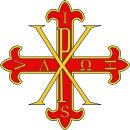Constantinian Order
| Sacred Military Constantinian Order of Saint George | |
|---|---|

Cross of the order
|
|
| Royal house |
House of Bourbon-Two Sicilies House of Bourbon-Parma |
| Religious affiliation | Roman Catholic |
| Ribbon | Light blue |
| Motto | In hoc signo vinces |
| Sovereigns |
Prince Carlo, Duke of Castro Prince Carlos, Duke of Parma |
| Grades | House of Bourbon-Two Sicilies: See all House of Bourbon-Parma: Sovereign Knight Grand Cross with Collar Knight Grand Cross Knight Commander Knight/Dame |
| Precedence | |
| Next (higher) | House of Bourbon-Two Sicilies: Royal Order of Saint Januarius House of Bourbon-Parma: None (Highest) |
| Next (lower) | House of Bourbon-Two Sicilies: Royal Order of Saint Ferdinand and of Merit House of Bourbon-Parma: |
|
Ribbon of the order |
|
The Sacred Military Constantinian Order of Saint George (Italian: Sacro militare ordine costantiniano di San Giorgio) is a Roman Catholic dynastic order of knighthood founded 1520–1545 by two brothers belonging to the Angeli Comneni family, currently bestowed by the former royal House of Bourbon-Two Sicilies as heirs of the Farnese.
Although it is not an order of chivalry conferred by the Holy See, membership is restricted to practising Roman Catholics.
The legendary origins of the Sacred Military Constantinian Order of Saint George trace its foundation to an apocryphal order founded by Constantine the Great. The Angeli Comneni grand masters who actually founded the order in the 2nd quarter of the 16th century received confirmations of its status in a series of papal briefs, a bull of Pope Clement VIII, and decrees of King Philip III of Spain, Ferdinand II, Holy Roman Emperor on 7 November 1630, Leopold I, Holy Roman Emperor on 25 June 1671, King John III Sobieski of Poland of 11 May 1681, and Ferdinand Maria, Elector of Bavaria on 8 July 1667 and 26 July 1669, in which the order was allowed to establish commanderies in Bavaria and the Palatinate.
Its incorporation as a religious order of the Roman Catholic Church hereditary in the House of Farnese and its heirs, the Bourbons, dates from the transfer to Francesco Farnese on 11 January 1698, an act confirmed in an imperial diploma, "Agnoscimus et notum facimus", of the emperor, Leopold I, dated 5 August 1699, and the apostolic brief, "Sincerae Fidei", issued by Pope Innocent XII on 24 October 1699. These confirmed the succession of the grand magistry to the Farnese family and its heirs as an ecclesiastical office and, crucially, did not tie it to tenure of sovereignty of the Duchy of Parma. Among the first major acts of the Farnese grand magistry were revised, amended and expanded statutes, issued on 25 May 1705 and confirmed in a papal brief dated 12 July 1706; both these confirmed the requirement that the grand magistry should pass by male primogeniture. Following the order's contribution to Prince Eugene of Savoy's campaign to drive the Turks from the Balkans between 1716 and 1718, Pope Clement XI, a former cardinal protector of the order, confirmed the order as a religious order of the Roman Catholic Church in the bull, "Militantis Ecclesiae", of 27 May 1718.
...
Wikipedia
